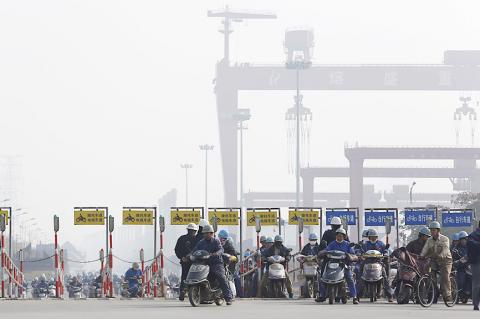China’s exports for last month grew much more strongly than expected, official figures showed yesterday, as a rebound in overseas shipments gained strength on demand from China’s US and Europe.
Exports increased 12.7 percent to US$202.2 billion from November last year, the Chinese General Administration of Customs said — compared with a forecast of 7 percent in a poll of 11 economists by the Wall Street Journal reported by Dow Jones Newswires.
Imports were up 5.3 percent year-on-year to US$168.4 billion, with China’s trade surplus last month expanding to US$33.8 billion from US$31.1 billion in October.

Photo: Reuters
The surplus for last month was also considerably larger than the median forecast of US$21.7 billion by the 11 economists.
The surprisingly strong exports data came after overseas shipments expanded 5.6 percent in October following a decline of 0.3 percent in September.
“China’s November exports came in much higher than expected,” ANZ bank economists Liu Li-Gang (劉利剛) and Zhou Hao (周浩) said in a report, citing “better demand from developed economies” the US and the EU.
The latest trade data came after China’s economy snapped out of a first-half slump, with GDP growth in the third quarter accelerating to 7.8 percent after it slowed during the first two quarters.
Earlier this month, official figures showed that China’s manufacturing growth maintained a strong pace last month from the previous month to stay at a 19-month high.
The purchasing managers’ index (PMI) was at 51.4, unchanged from October, the Chinese National Bureau of Statistics said.
A reading above 50 signals expansion while a figure below indicates contraction.
In the first 11 months of the year, China’s total trade, combining exports and imports, reached US$3.8 trillion, up 7.7 percent from the same period last year, Customs said. The government’s target for this year is 8 percent.
“The data in January to November suggest that China could achieve the 8 percent trade growth target for the whole year,” Liu and Zhou said.
However, they cautioned against overoptimism, stressing what they described as “inflated export growth in the first half of the year” when companies were caught overinvoicing, which instigated a crackdown by Chinese authorities on the practice.
Meanwhile, China, the world’s largest buyer of iron ore, increased imports of the steelmaking ingredient to a record last month as traders replenished stockpiles.
Imports totaled 77.84 million tons last month, up from 67.83 million tonnes in October and 65.78 million tonnes a year earlier, the latest customs data showed.
Cumulative shipments in the first 11 months jumped 10.9 percent to 746.1 million tonnes, the customs agency said.
Iron ore entered a bull market in July as users in China increased stockpiles that shrank in March to the lowest level since 2009.
The market’s supply and demand outlook is positive as producers globally struggle to deliver larger volumes and demand in China continues to grow strongly, Rio Tinto Group iron ore chief executive officer Andrew Harding said on Wednesday.
Additional reporting by Bloomberg

Sweeping policy changes under US Secretary of Health and Human Services Robert F. Kennedy Jr are having a chilling effect on vaccine makers as anti-vaccine rhetoric has turned into concrete changes in inoculation schedules and recommendations, investors and executives said. The administration of US President Donald Trump has in the past year upended vaccine recommendations, with the country last month ending its longstanding guidance that all children receive inoculations against flu, hepatitis A and other diseases. The unprecedented changes have led to diminished vaccine usage, hurt the investment case for some biotechs, and created a drag that would likely dent revenues and

Global semiconductor stocks advanced yesterday, as comments by Nvidia Corp chief executive officer Jensen Huang (黃仁勳) at Davos, Switzerland, helped reinforce investor enthusiasm for artificial intelligence (AI). Samsung Electronics Co gained as much as 5 percent to an all-time high, helping drive South Korea’s benchmark KOSPI above 5,000 for the first time. That came after the Philadelphia Semiconductor Index rose more than 3 percent to a fresh record on Wednesday, with a boost from Nvidia. The gains came amid broad risk-on trade after US President Donald Trump withdrew his threat of tariffs on some European nations over backing for Greenland. Huang further

CULPRITS: Factors that affected the slip included falling global crude oil prices, wait-and-see consumer attitudes due to US tariffs and a different Lunar New Year holiday schedule Taiwan’s retail sales ended a nine-year growth streak last year, slipping 0.2 percent from a year earlier as uncertainty over US tariff policies affected demand for durable goods, data released on Friday by the Ministry of Economic Affairs showed. Last year’s retail sales totaled NT$4.84 trillion (US$153.27 billion), down about NT$9.5 billion, or 0.2 percent, from 2024. Despite the decline, the figure was still the second-highest annual sales total on record. Ministry statistics department deputy head Chen Yu-fang (陳玉芳) said sales of cars, motorcycles and related products, which accounted for 17.4 percent of total retail rales last year, fell NT$68.1 billion, or

MediaTek Inc (聯發科) shares yesterday notched their best two-day rally on record, as investors flock to the Taiwanese chip designer on excitement over its tie-up with Google. The Taipei-listed stock jumped 8.59 percent, capping a two-session surge of 19 percent and closing at a fresh all-time high of NT$1,770. That extended a two-month rally on growing awareness of MediaTek’s work on Google’s tensor processing units (TPUs), which are chips used in artificial intelligence (AI) applications. It also highlights how fund managers faced with single-stock limits on their holding of market titan Taiwan Semiconductor Manufacturing Co (TSMC, 台積電) are diversifying into other AI-related firms.